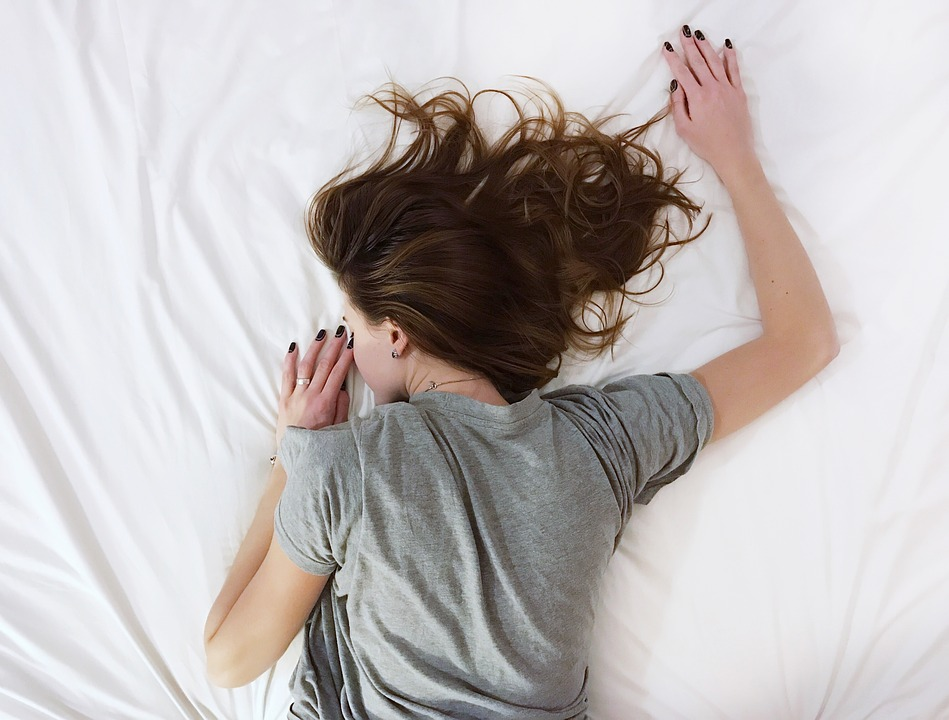Have you ever caught yourself wondering “why do I sleep so much?” Are you worried that you’re getting too much sleep or are you thinking that you sleep too long? You’re not alone.
Millions of people across the world are in a similar position and find themselves asking questions like “why do I sleep so much?” and “are my sleep patterns normal?”. It can seem like a confusing and daunting situation, but a little knowledge goes a long way as you work toward understand your body and daily habits.
Here’s all you need to know about whether you are sleeping too much and, if it turns out that you are, how to find the source of your issues.

The Importance Of A Healthy Sleep Pattern
Healthy sleep is one of the most important aspects of your daily health routine. After all, this is the time for your body to rest and recuperate for the day ahead. A positive sleep pattern brings many rewarding benefits, including:
- Improved mood
- Boosted energy levels
- Improved memory
- Increased lifespan
- Improved brain development
- Sharper attention span
- Faster weight loss
- Healthier skin, nails, and teeth
- Reduced stress, anxiety, and depression
- Better hair
Essentially, then, if you’re planning on improving your choices toward a healthier lifestyle, establishing a better sleep pattern is one of the smartest things you can do.
How Long Should I Be Sleeping For?
No two people are identical, so it’s important to recognise that any suggestions on sleep patterns should be used as a rule of thumb instead of being considered a definitive answer. However, most people are of the belief that the average person should be sleeping for around 8 hours per night. While this is a good starting point, it isn’t quite as accurate as it should be.
In actuality, the amount of sleep you should get is determined by a number of factors. Age is one of the most significant elements to consider. Here are the suggested number of hours people should sleep per night, depending on your age bracket:
0-3 months: Between 14 and 17 hours per day, not at once.
4-11 months:Between 12 and 15 hours per day, not at once.
1-2 years:Between 11 and 14 hours per day, not at once.
3-5 years: Between 10 and 13 hours per day, not at once.
6-13 years: Between 9 and 11 hours.
14-17 years: Between 8 and 10 hours.
18-64 years: Between 7 and 9 hours.
65+ years: Between 7 and 8 hours.
For most people, between 7 and 9 hours per night is deemed an adequate amount of sleep. While a lot of people worry about getting too little sleep, getting too much sleep can be equally concerning.
There’s probably nothing to worry about if you’ve enjoyed a Sunday morning lie-in after a particularly tough week at work, or if you’ve slept for 11 hours straight following international travel from one timezone to another. However, those that find themselves oversleeping on a regular basis should not ignore the issue. Identifying the source of those problems is the first step to overcoming them.

So, Why Do I Sleep So Much?
The fact that your body needs 20 minutes more sleep than a friend isn’t anything to worry about, but excessive oversleeping is a genuine health condition known as hypersomnia. It is something that affects roughly 1 in 50 adults.
In some cases, hypersomnia is unconnected to other issues. In the majority of cases, though, it is a symptom of an underlying issue. Here are some of the reasons that you might be sleeping for longer than the average person:
Anxiety Or Depression
Studies show that around 15% of people with depression are prone to oversleeping. Likewise, individuals suffering from anxiety and related mental health conditions are more likely to shown signs of hypersomnia too.
Fighting mental health conditions on a daily basis can be exhausting while sufferers may also kid themselves into thinking that being asleep is the best way to shut themselves away from their demons. Unfortunately, science also shows that oversleeping worsens depression, which makes it a highly vicious cycle.
If you are guilty of oversleeping and show other signs of mental health issues, this could be the source of the hypersomnia bouts. In this case, speaking to a medical professional about getting a diagnosis and the right medications is key. Fight back against depression, and your sleep patterns should improve as a result.
Obesity
A high BMI will take its toll on the body as you have to work harder to complete daily tasks such as walking, climbing stairs, and even breathing. The extra strain on the body will tire you out, especially if you haven’t always been a bigger person.
Extra sleep is needed for the body to recuperate, but it can leave you with reduced energy levels, which will inevitably leave you feeling overtired during the day. This will continue to make you sleep longer until you lose the weight. It’s important to do this in a safe and sustainable fashion, though, which is why you must see a professional.
On a similar note, poor food choices can lead to oversleeping as malnutrition can leave you feeling devoid of energy. Likewise, if you eat foods that the body is allergic too, the ensuing pains and discomfort may encourage you to head straight to bed. This can have a truly negative impact on your overall sleep habits.
Heart Disease
Researchers have yet to discover why there is such a strong link between heart disease and oversleeping. However, sleeping for 9 to 11 hours rather than 8 hours can increase the risk by 38%. Researchers have also noted that hypersomnia may be a sign that a heart problem already exists.
Given the importance of your heart to your overall health, it’s vital that you gain an accurate diagnosis and suitable treatment plan ASAP. Otherwise, oversleeping will put more pressure on your ticker, exacerbating the situation at a rapid rate.
Medication Side Effects
Tiredness and oversleeping can be caused by medications. So, if you are being treated for another health condition with any type of medication, you may want to speak with your doctor to rule out this possibility. If it is the reason behind your hypersomnia, switching your medication should help.
Medications aren’t the only chemicals that can influence your sleep patterns in a negative manner. Alcohol and drug abuse can lead to hypersomnia, and not just because you’re tired from partying. Cut this problem out of your life, and a noticeable difference is likely to be seen.
Headaches & Related Issues
Physical exhaustion isn’t the only reason for overtiredness and requiring more sleep than the average person. Mental exhaustion is equally problematic and can be brought on by a host of sources. Leaving those medical conditions untreated will cause ongoing sleep problems.
Migraines and headaches will cause daily challenges that essentially leave your body needing more time to recover at night. Meanwhile, memory loss or dementia can cause a level of stress that also forces you to sleep longer. So, if you’re sleeping too much because of those symptoms, it’s vital that you get them checked out.
On a similar note, hearing loss or poor eyesight can be equally damaging as you have to constantly train to interact with your surroundings. Getting the right prescription could be the first step towards reducing the mental tiredness and slowly decreasing the amount of sleep required each night. This is the time to act.
Sleep Apnea & Narcolepsy
Oversleeping can be linked to other sleep disorders. If you’re not getting a normal sleep pattern due to the disruptions of sleep apnea or narcolepsy, for example, there’s a strong chance that it will result in oversleeping. After all, you’ll need to increase the quantity to make up for the quality.
Sleep apnea is a disorder in which you temporarily stop breathing. This can be due to obstructions in the airwaves or because of issues with the communication between the brain and your muscles. Undergoing sleep studies, known as polysomnography, can confirm the condition before leading you to the right treatment. When sleep is improved, it should reduce the duration.
Narcolepsy affects around 1 in 2,000 people and is a nervous system disorder that leads to exhaustion during the day. Whether this manifests in daytime sleep attacks or longer night sleep sessions, the hypersomnia is just one of several related problems. Cataplexy, sleep paralysis, and hallucinations are all common symptoms of Narcolepsy, too. Professional treatment should not be postponed if you think you may be suffering from this condition.
Thyroid Issues
An underactive thyroid will almost certainly leave you feeling exhausted and fatigued, which will naturally lead you to sleep for longer. This is directly correlated to the reduced production of the thyroid hormone, and is something that needs to be treated by a medical expert right away.
Tiredness isn’t the only side effect of low thyroid production, either, so treating this can improve other aspects of your life Conversely, an overactive thyroid may also cause you to sleep for too long. Either way, ignoring the problem is not an option.
Poor Evening Habits
Not all underlying causes of oversleeping are dangerous to your health. In truth, you may have simply got yourself into a poor evening routine. Sitting on your smartphone just before bed, for example, can stop you from reaching the REM stage of sleep due to the blue light exposure.
Learning to relax your body and mind so that you can ease your way into a night’s sleep can be the smartest thing you’ll do. Aside from the physical benefits, this new routine can trick your brain while that placebo-like impact could make all the difference.

While identifying and treating the source of your oversleeping problems is essential, you should not overlook the need to take additional steps for a better sleep pattern. Ultimately, if you wish to reduce the quantity of sleep that’s required, you’ll need to increase the quality.
This can be achieved in a number of ways, here are five of the best:
- Improve your bedroom surroundings
A comfy bed may seem like a purchase that will make you sleep more. On the contrary, though, if you can reach the REM stage of sleep far sooner, you’ll wake up feeling fresh and energised even after reducing the duration of sleep down to a normal level. Avoid clutter and invest in new sheets too.
- Sleep when you need to
While it’s important to establish a routine, trying to force yourself to sleep when you’re not tired will lead to frustrations. In turn, you’ll become overly tired when you inevitably fail to sleep due to the stress. If you can’t sleep after half an hour, get up and do something relaxing until you’re ready for sleep.
- Follow a routine
Getting your body into a routine that teaches your mind and muscles that it’s time to prepare for sleep is vital too. If you enjoy regular exercise, try to hit the gym at the same time each day. Likewise, eating your final meal of the day and having a hot bath at the same times encourages the body clock to adapt.
- If you nap, don’t nap too late
The transition into a more natural sleep pattern can be hard to take, and you may still find yourself requiring a nap from time to time. However, napping too late in the day will probably have a negative impact when you attempt to sleep at night. So, either take a nap in the early afternoon, or skip it.
- Get up
When you wake up in the morning, especially when you have nothing scheduled, it can be very tempting to hit the snooze button and go back to sleep for another hour. While it may feel great when you eventually get up, this extra sleep can come back to haunt you later in the day. When you wake up (assuming it’s not due to disrupted sleep at say 2 AM), get out of bed.
The Final Word
Improving your sleep pattern is one of the most significant changes you’ll ever implement into your life and can go a long way to establishing a healthy lifestyle. Find a way to get yourself to that magical 7 to 9 hours per night – or at least very close to it – and you should see positive benefits very quickly.

